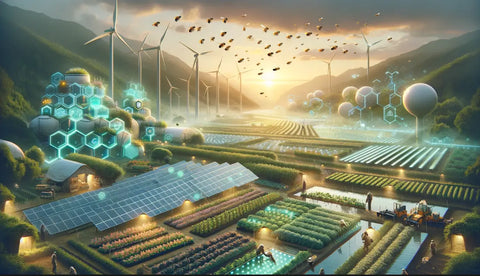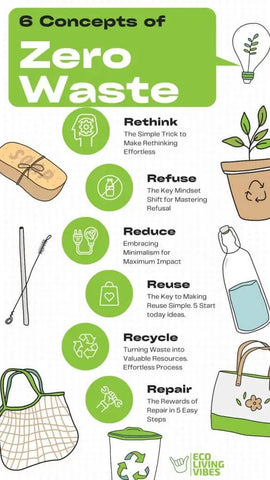The Importance of Zero-Waste Living
A Zero-Waste Lifestyle: Your Eco-Friendly Adventure Awaits
Zero-Waste
In an era where disposable convenience is just a lazy reach away and our ecological footprints are more like stomps, adopting a zero-waste lifestyle is less of an option and more of a planetary plea. This isn't about flipping your life on its head by next Tuesday or transforming into an eco-warrior by Friday. Rather, it's the sum of tiny, mindful choices that collectively create a substantial positive ripple. So, with your trusty reusable mug in hand, let's dive into this green expedition together.
Reduce, Reuse, Recycle: The Eco-Friendly Trio
Before you hit the snooze button on this well-worn phrase, let's spice it up with a bit of humor and a dose of reality.
-
Reduce: Imagine going on a diet, but for trash. The goal here is to consume smarter and slimmer. Say no to that sparkly but utterly unnecessary packaging and choose items that aren't enveloped in plastic. Embrace the minimalist vibe: where less really is more, except when it comes to dessert.
-
Reuse: Take a moment before you chuck something away to consider, "Could this item live a second life?" Whether transforming jars into trendy lanterns or repurposing old shirts as chic cleaning cloths, it's about spotting potential everywhere. Think of it as thrift shopping in your own home.
-
Recycle: Consider this the last step, not the first. While recycling has its merits, it's not a catch-all solution. It consumes resources, and not everything you place in the bin is reborn. Learn your local recycling dos and don'ts and become the guru of green you're destined to be.
Table of Eco-Strategies
| Approach | Implementation Tips | Quirky Fact |
|---|---|---|
| Reduce | Opt for bulk purchases, digital over physical, minimal packaging. | Reducing trash could save more energy than powering your Netflix binge. |
| Reuse | Choose reusable goods, get crafty with DIY. | One person's junk can transform into another's upcycled masterpiece. |
| Recycle | Sort diligently, understand local recycling policies. | Recycling an aluminum can could save enough power to blast your workout playlist. |
Composting: Your Waste’s Second Act
Think of composting as sustainability’s spellbook. It transforms kitchen leftovers into a garden’s treasure. Whether you’re blessed with a sprawling backyard or a cozy apartment, there’s a compost method for you. Worm composting is especially great for small spaces. Picture it: quiet, low-maintenance pets that give back to the Earth.
Sustainable Eating: Deliciously Green
Cutting back on meat or embracing plant-based meals can significantly reduce your ecological footprint. It's like being in a relationship with meat where you're just taking a break, not breaking up. Shopping locally and seasonally lessens environmental transport costs and supports community farmers — double the benefit. And yes, buying in bulk isn't reserved for doomsday preppers; it's a savvy move to minimize waste.
Energy Wisdom: Bright Ideas for Saving Power
Upgrading to energy-efficient gadgets and bulbs can slash your power usage. It’s like swapping your old, gas-guzzling clunker for a sleek electric vehicle. Pay attention to how you consume energy, like turning off lights — a small action with a big impact, akin to choosing the stairs over the elevator.
Water Wisdom: Every Drop is Precious
Embracing low-flow fixtures and mindful water habits can dramatically reduce your water footprint. Treat water like a scarce commodity (which it is), whether it's fixing leaks ASAP or harvesting rainwater for your garden. Imagine water as your mobile data plan: valuable and not to be wasted.
Green Transit: Eco-Friendly Journeys
Choosing public transit, biking, or walking not only reduces emissions but also boosts your health. It’s like hitting two birds with one stone, without harming any birds.
Championing Sustainable Businesses: Making Your Money Talk
Your spending habits are a powerful form of advocacy. Supporting businesses that prioritize sustainability sends a clear message about the values you champion. It's akin to being a superhero, where your power is your purchasing choice.
Learn and Lead: Sharing the Green Light
Keeping informed and engaging with your community magnifies your impact. Spread the word, join eco-initiatives, and inspire others to join the green movement. It’s like being in an exclusive club, but the goal is to welcome as many people as possible.
Wrapping Up: Every Little Bit Helps
Embarking on a zero-waste journey is about embracing gradual changes, not striving for instant perfection. Every mindful choice, no matter how small, paves the way to a more sustainable future. So let’s continue, one eco-friendly step at a time, with our reusable cups proudly in hand.

You can make great strides toward sustainability and garbage-free living with the right equipment. Through utilizing these well selected guides and tools, you may get a deeper understanding of environmentally conscious practices and discover methods to integrate them into your daily routine. Here are some resources that can be helpful as you strive toward a greener lifestyle:
Cut, Repurpose, and Recycle
Bea Johnson's "Zero Waste Home" and other writings by ecologists and minimalists are highly recommended.
Resources Available Online: There is a wealth of information about recycling, including how to properly recycle different goods, on the website of the United States Environmental Protection Agency (EPA).
Easy Composting
Learn all you need to know about worm composting or how to build up your own compost bin with the aid of the many detailed video tutorials that can be found online, especially on sites like YouTube.
You may learn composting the hard way by enrolling in one of the numerous programs offered by local gardening centers and community organizations.
A Healthier Eating Plan
View documentaries such as "Cowspiracy" and "Forks Over Knives" to get knowledge on how human food interacts with the environment.
A Cookbook for Sustainable Living: Try searching for cookbooks that offer plant-based dishes or ones that use seasonal, local items.
Raising the Bar for Home Energy Savings
A plethora of information on energy efficiency and power-saving appliance selection is available on Energy Star and related websites.
Simple DIY Energy Saving Strategies: If you want to know how to make your home more energy efficient, there are a lot of resources online that can help you with things like draught-proofing and insulation installation.
Tips for Minimizing Water Use
Water conservation tips, such as fixing leaks and choosing water-efficient equipment, are abundant on the website of the Environmental Protection Agency (EPA).
Reduce Water Use Independently: To help you install water-saving gadgets all throughout your house, you may find instructions online.
Making Moral Decisions When Traveling
Information Gathered from the Local Area: To reduce your impact on the environment, research the many green transportation options in your area, such as public transportation, bike lanes, and car-sharing programs.
Convenient Apps: Apps that are designed specifically for cyclists, like Strava, or that provide information about local public transportation might help you plan trips that are less impactful on the environment.
Raising Awareness of Eco-Friendly Companies
Resources for Moral Buying: Look into the environmental and ethical practices of companies by using rating apps and websites.
Improve Your Community's Economy: Locate artists, farmer's markets, and secondhand shops in your area by perusing the phone book. Buy locally, support small businesses, and reduce your impact on the environment.
Chances to Learn and Speak Out
Take use of free online education resources like edX and Coursera to educate yourself on environmental science and sustainability methods.
Join a sustainability-focused online forum or a local environmental group to keep yourself occupied and engaged in the community.
Now that you have these resources, you can take action to improve your environmental footprint and lead a greener lifestyle.







Leave a comment